Brass: Lancashire and Brass: Birmingham are economic and route/network building strategy games for 2-4 players
60-120 minutes
Martin Wallace, Gavan Brown (Birmingham), Matt Tolman (Birmingham); Published by Roxley Games
Brass was originally published in 2007 and reprinted in 2018 as a deluxe streamlined game and renamed Brass: Lancashire. At the same time in 2018, Roxley Games released a sequel, Brass: Birmingham. The sequel is similar to the original, but with some unique twists. Since both games follow the same basic structure we will take a look at both simultaneously in this board game review.
Note: We will use the term “Brass” to refer to both games collectively and will use “Lancashire” and ”Birmingham” to refer to each specific game.

In a game of Brass, players are entrepreneurs in Industrial Revolution era England with the goal of creating the most extensive network to sell the goods their buildings produce. The Industrial Revolution was a time of rapid change and development where old technologies rapidly became obsolete and this Euro game captures that entrepreneurial drive.
Game Play - Brass: Lancashire and Brass: Birmingham general overview
Canal Era: players build a shipping network between their own and their opponents buildings. At the end of the era, the players perform mid-game scoring of their buildings and networks. Canals and “level I” industry buildings then become outdated and are destroyed (just removed from the board unless the players are extremely dramatic and never want to play again. Hey, no judgement.). Only level II and higher industry tiles remain on the board.
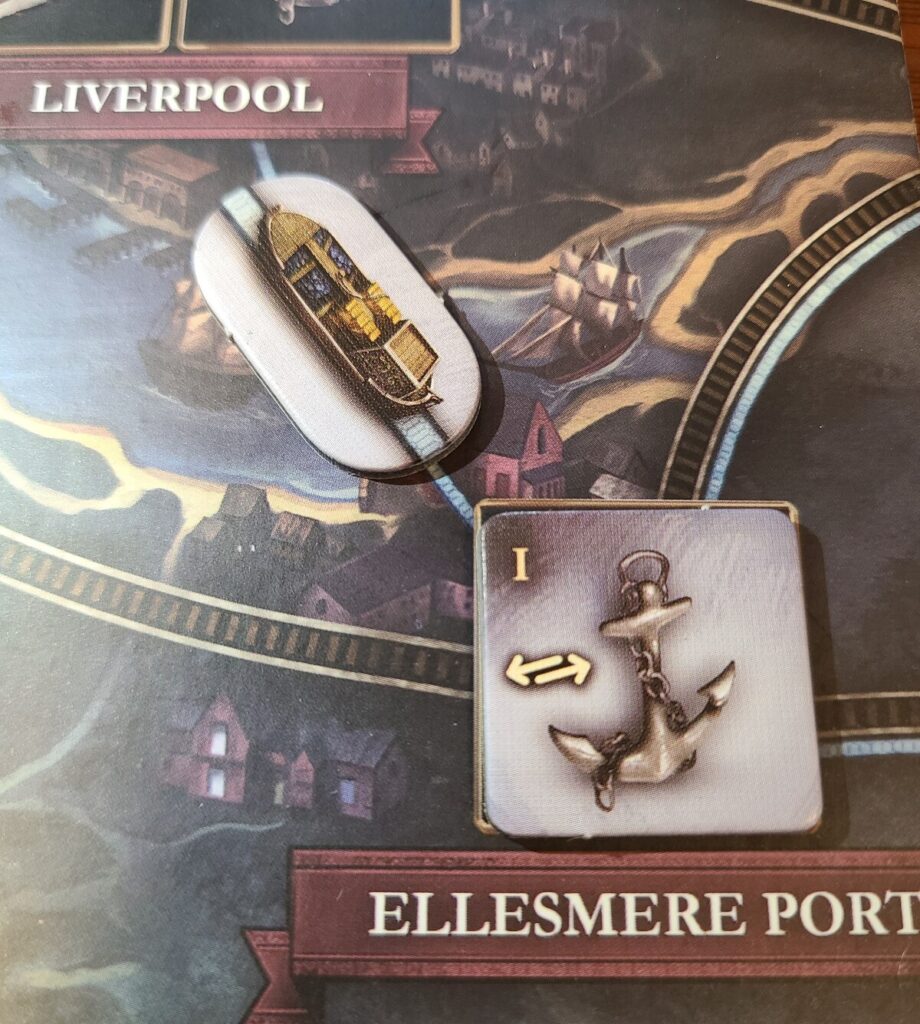
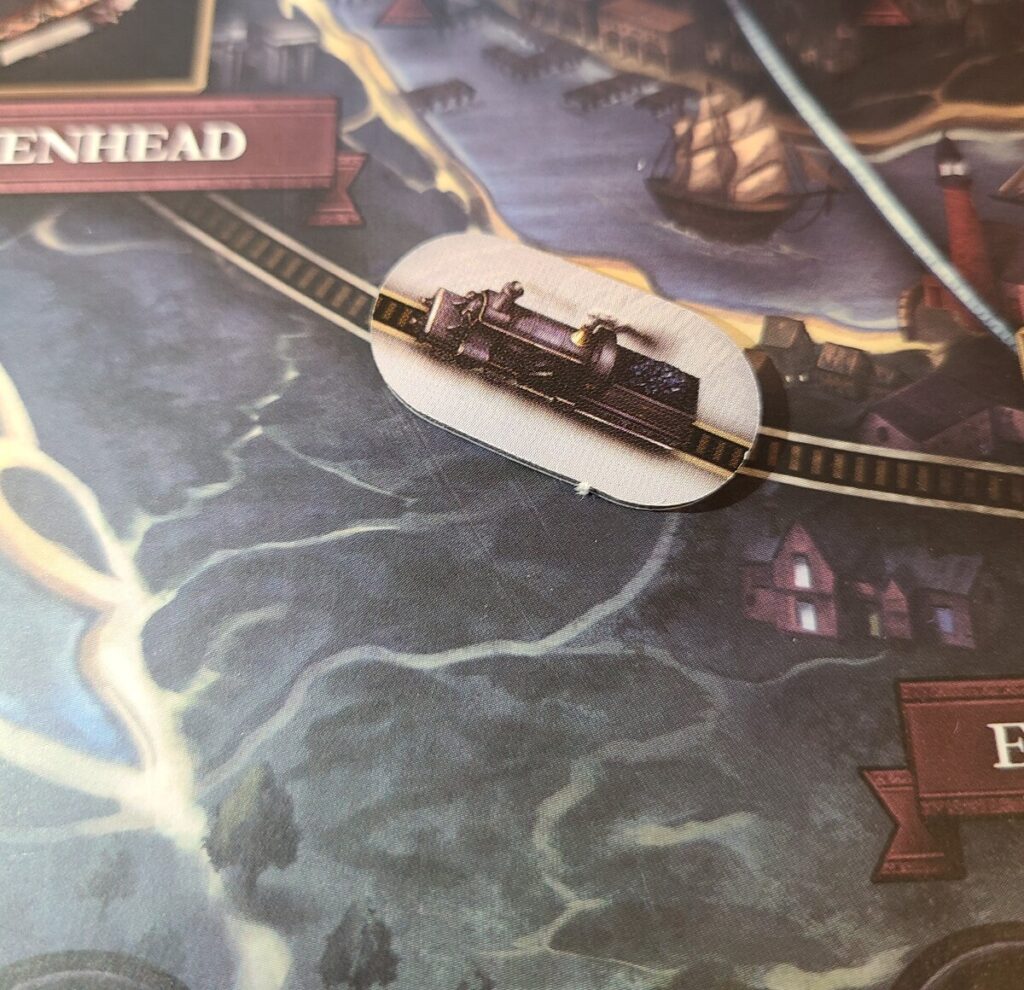
Rail Era: Player’s networks start from scratch in the second era of the game. They may try to re-build their network, this time with trains, in the same locations, or can head off in different directions.
General Rules*
*This is a general overview, not a how-to-play explanation
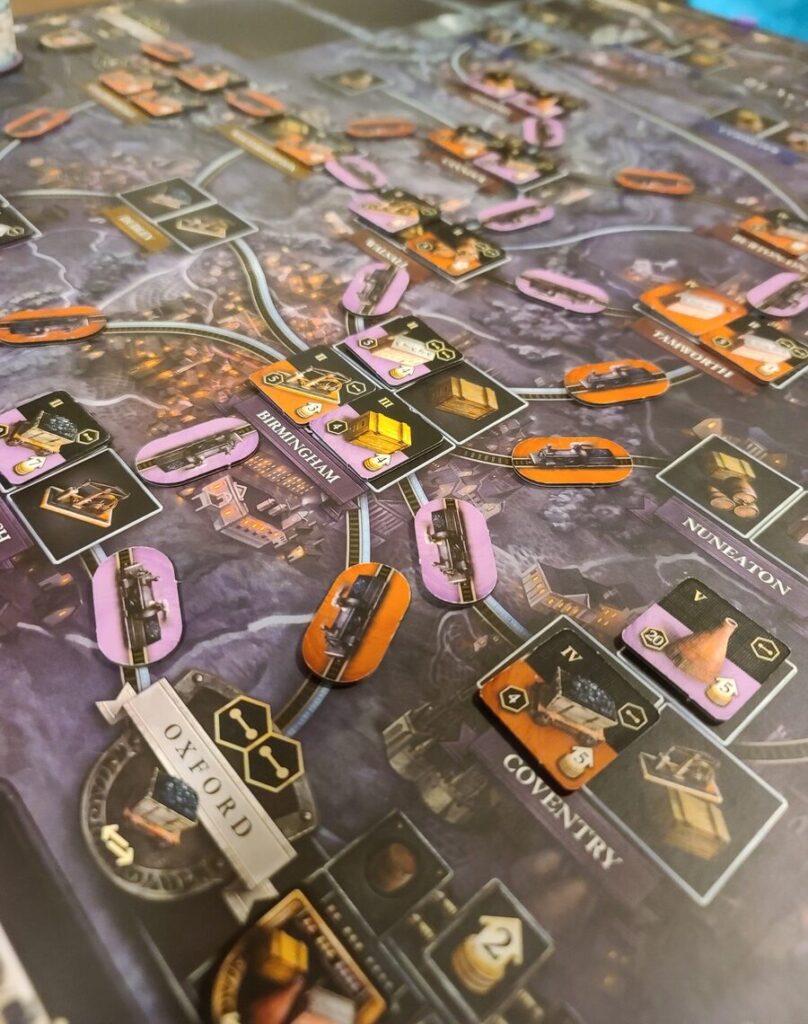
Players start the game with a hand of 8 cards, a player mat full of industrial buildings to be constructed throughout the game, starting money, and an income level of 0. Turns are structured as follows:
1. Actions
Players get 2 actions per turn, and MUST discard at least 1 card per actions
*This is a CRITICAL rule and very easy to mess up if you’re going too fast, get interrupted by a child screaming for “bedtime hot tea” or are generally bad at remembering to discard (*Emily*). ProTip: get in the habit of always counting your hand before the next player starts their turn, even if you’re nearly certain you did everything right. You should almost always have 8 cards (except at the very end of each round).
- Build: Place an industry tile from your player mat to the board. Pay the cost indicated on your player mat and discard an appropriate card:
- Location card: names a location, does not have to be connected to your network to build
- Industry card: can build a specific type of industry building (ex. Coal, iron, wool, etc). MUST be connected to your network to build
- Network: Place a link (ship/train) tile on the board
- Develop: Remove 1-2 industry tiles from your player mat and return to the game box. These tiles may not be used for the rest of the game, but removing them allows the player to access more powerful tiles
- Build: Place an industry tile from your player mat to the board. Pay the cost indicated on your player mat and discard an appropriate card:
2. Determine new turn order: The player that spent the least amount of money goes first in the next round
3. Take Income: Based on your position on the Income Track
Pro Tip: At the end of the canal era only Level II buildings and higher remain on the board, which means strategic players might aim to get higher-level buildings on the board early in order to score them at the end of both Eras.
Brass has what we feel is a deceptively simple sequence of play. Really all you do is play a card, do an action, take money, repeat. But it is the little details and nuances of what is allowed/not allowed within each action and the interaction between players that give these games their strategic depth. There can be a ton of interaction (or not much depending on variant and the player’s preferences) where players leverage their opponent’s networks and industry tiles.
Lancashire VS. Birmingham
While both games have the same basic turn structure and sequence of play there are some differences between each game that impact gameplay. Here is a look at the differences according to the rulebook, scroll down for our opinions on each.
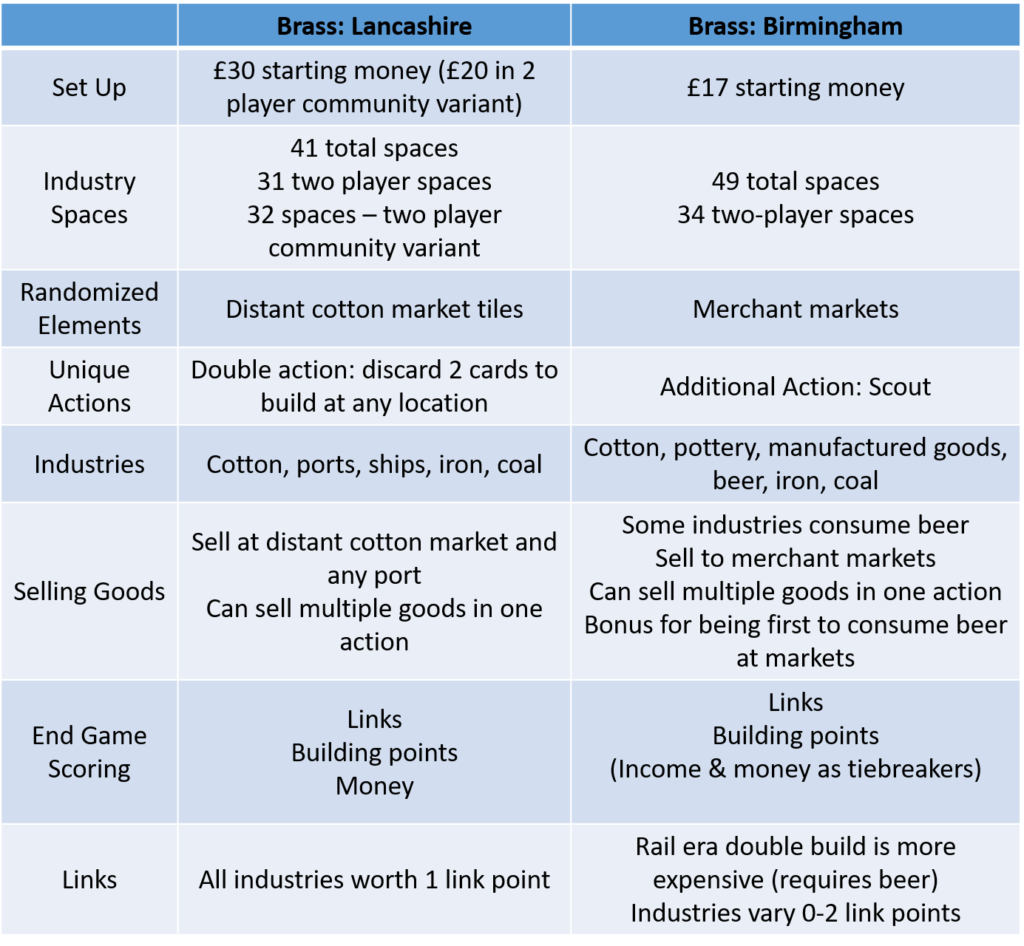
And with those rules and gameplay differences both games of Brass have a different feel to them. Here’s our take on those differences.
*Note: The below list is our opinions and experiences. Drop a comment to let us know what you think!
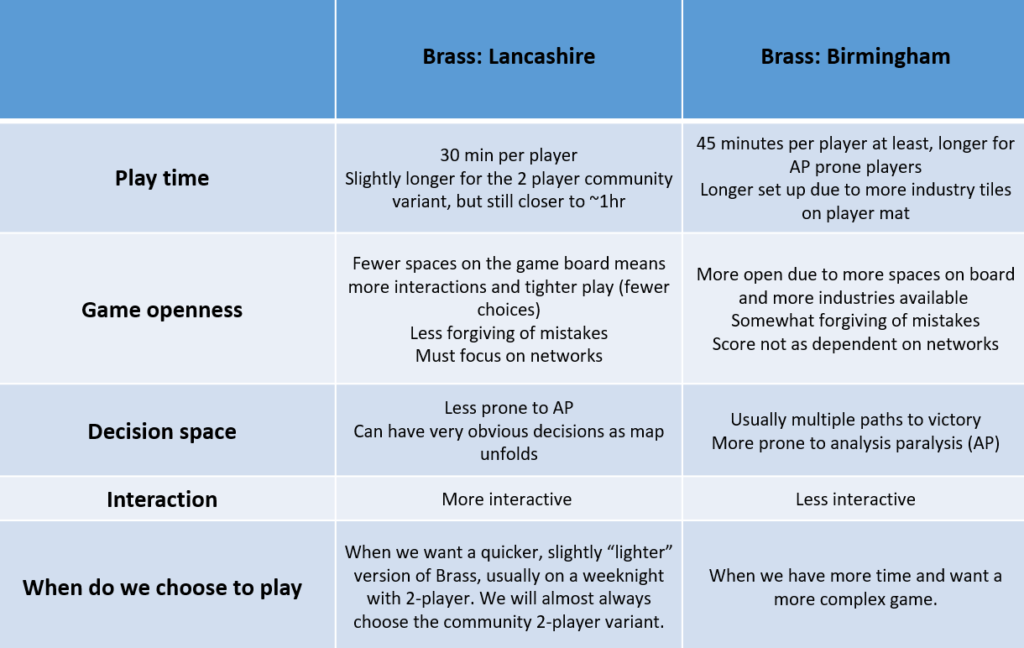
Brass has a lot going on! While Lancashire and Birmingham are clearly part of the same game family they both feel and play differently. Are the both worth keeping in a collection? To us, yes.
They offer different things and there are situations where we would choose one over the other.
Got a late start to adult time after the kids go to bed, but you’re still craving a deep economic game? Lancashire.
Have some extra time and want to go at your own pace and try some new things while still playing a tight game? Birmingham.
We think Lancashire is better for players new to Brass, or those who are just starting to get into heavier games. Birmingham is better for players experienced with Brass and already comfortable with heavy strategy games.
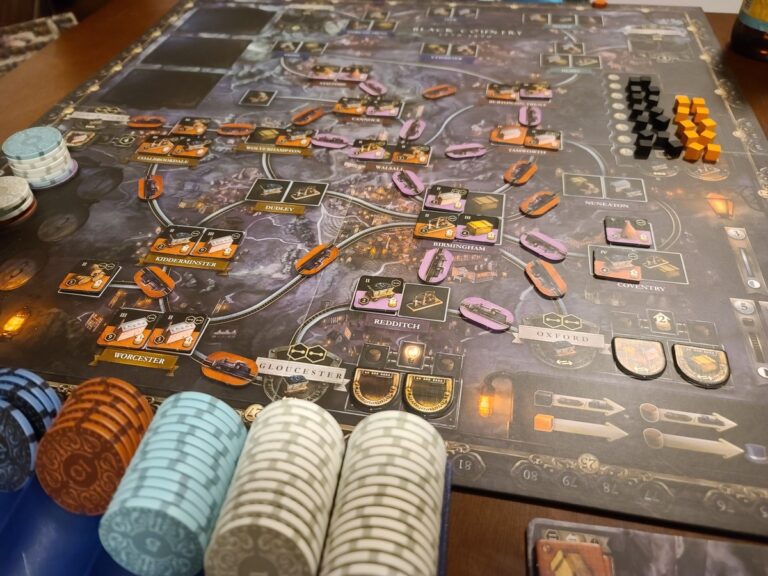
Sarah's Take
I really, really like the Brass games. If you look at my BGG profile (smwoz17) this would not be surprising as I have them rated very high. I love the tight economies of both games and the pressure to get something on the board that will start making you income.
It doesn’t hurt that I am strangely good at this game too. We play a lot of games and it is not often that a game just comes intuitively for me the way Brass does.
Brass Lancashire is a tighter game, which I tend to enjoy more than Emily. I enjoy the pressures of needing to make the optimal move. Lancashire also forces us to interact slightly more than Birmingham, which is a fun change because so many Euros just have us playing off in our own little worlds.
The artwork and color choices in these games are outstanding. The dark color palate is fitting for both the theme and the gameplay, while not being too much. The components in the deluxe editions from Roxley are top notch and really add to the game.
Emily's Take
Sarah and I each have our own strengths in gaming. Something about Brass strategy just DOESN’T WORK in my brain and works very well in Sarah’s. When I’m having a great game and scoring the highest I’ve ever scored, somehow Sarah is scoring even higher.
So taking that into account, it’s a surprise that Brass in general is still one of my favorite economy games. I’m convinced that next time I’ll have it figured out and will have a stunning victory over Sarah that will redeem the many times I’ve lost to her. I think it does say something about the quality of the game when you can still have fun while consistently losing.
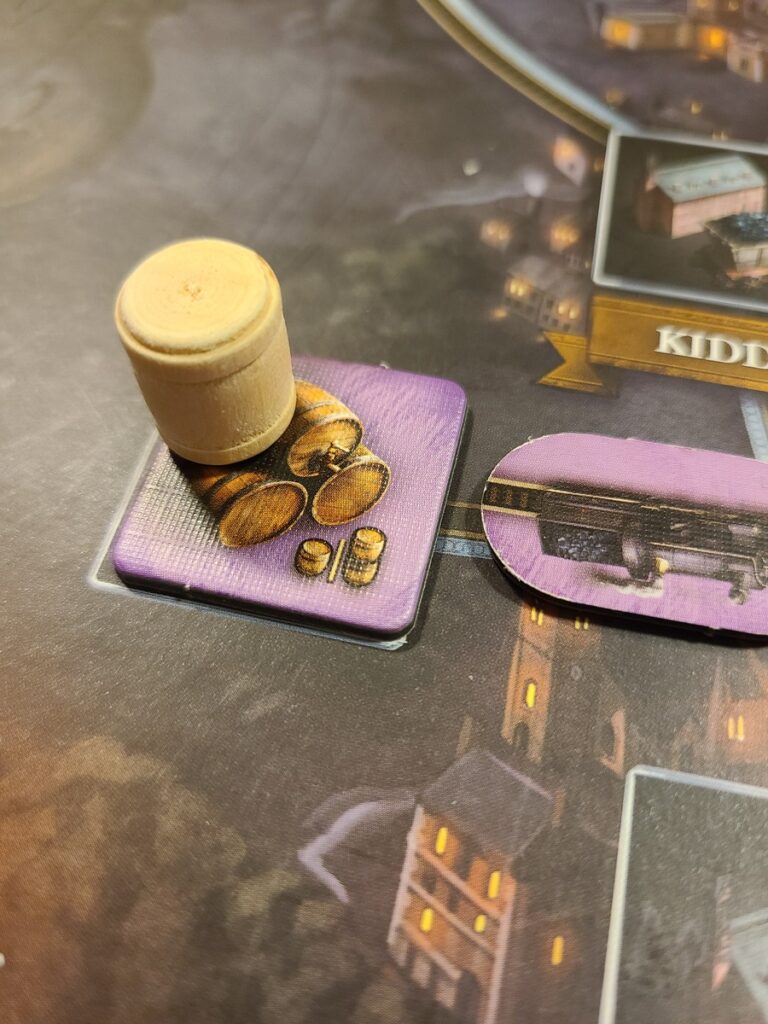
Also, we have the deluxe editions of both with the Iron Clay poker chips and little wooden Birmingham beer barrels. These component upgrades make the game more fun. It’s proven science.
First Play
This was a tough first play, and we consider ourselves very experienced when it comes to heavy economic games. The overall gameplay is fairly simple, and the rulebook was pretty good (see below), but there are a TON of tiny, intricate rules that are a lot to keep track of at first. Particularly tough for us to remember at first were the rules about coal/iron and how to use the market vs. industry tiles. **Sarah’s input: I still struggle with coal/iron. Sometimes it’s so hard to wrap your brain around something and this one gets me every time. There is no player aide in this game, and it really could have benefited from one**
Rulebook
Emily tends to be the rulebook reader in our family. She typically doesn’t like rulebooks that describe gameplay before they describe how to use the different game components and mechanics, but for this game it worked very well. The pictures chosen for the rules brought a lot of clarity. There were a few rules we had to turn to BGG to get clarity on, but overall we don’t have any complaints about the rule book for how heavy the game is.
Subsequent Plays
This game gets better after playing it a few times. The intricate rules become a bit more natural after a few plays and easier to remember. We’d say re-playability for Brass in general is just OK, since basically nothing changes unless the players change up their strategy. We address this by spacing out our plays and switching between the different versions. Once every few months is enough time between plays that we stay interested and engaged. There’s enough interaction, too, that playing with different groups of people who have different approaches also switches up the feel of the game and keeps it interesting.
Play Time, Best Number of Players
See above tables for a comparison. We like this game because it’s so good at 2 (both versions), but we also think it scales very well and is interesting to mix it up by playing 3 or 4.
Parent Perspective
This game is a toughie for us as parents, despite the relative speed of the Lancaster version. The mechanics are so reliant on making sure your card counts are correct and it’s not always easy to remember to discard when you have big actions with a lot of activity. We’ve had major mix-ups in our card counts when trying to play with kid (or life) interruptions or when we’re just going too fast and mess up somewhere.
We recommend making sure the kiddos are either totally asleep or otherwise occupied when playing Brass. If an interruption comes up, try to finish the current turn and take a break. Pausing in the middle of someone’s turn can lead to disaster (miscounted cards, complete collapse of your plan because your brain is distracted, etc).
Rating
9/10: Fantastic (both versions)
Both Brass: Birmingham and Brass: Lancashire are at the top of our “will frequently play” collection. Brass: Birmingham in our opinion might be a better game overall, but for 2 players we far prefer Lancashire. In a game with more than 2 players, we’d likely choose Birmingham.
*See our rating scale HERE
Click through for more posts, or follow us to see what we’re playing and for new post updates!

This is great, we are always on the look out for good British themed games, these sound like something both myself, my wife and son would love to play.. we’ve only just entered the world of Arkham Horror after years of leisure game playing and looking for new games.. I’ve recently backed a good lot of Kickstarter games, but always on the look out, your review is perfect. Thank you..
Thanks for reading! Brass one of our favorites, so of course we had to cover it as one of our first couple reviews! If you like British themed games, we’d recommend London if you haven’t already played it. We likely won’t review it since we have the old edition but I heard the new print is about the same with some minor improvements.
Which kickstarter games have interested you?